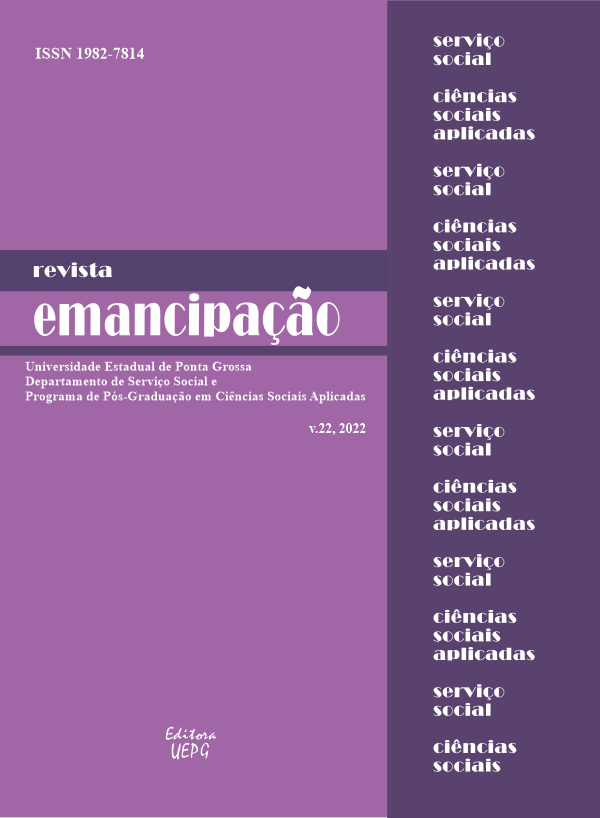Capitalism and criminalization of popular practices: the question of abortion
Main Article Content
Abstract
The research developed here concerns the criminalization of popular practices by women, triggered around the 16th century, a period in which the rise of the capitalist mode of production took place with its respective transformations in the western world, involving the whole of social life. From this historical approach, we sought to reflect the legacy of such a process in contemporary society. The starting point is the social relations modified from modernity, whose political and religious system condemned some practices that were once common at the time, especially affecting women, who, in the course of time, lost their spaces in public life and were condemned to private life. Such alterations aimed to guarantee the necessary conditions for the development of capitalism. Motherhood, childhood and the family occupied a central position for the realization of these changes. In contemporary Brazil, the result of this historic loss of women’s autonomy can be seen in the 500,000 clandestine pregnancy interruptions that take place annually. Of this total, about half of the women resort to the Unified Health System due to complications related to abortion. Contributes to making this situation even more serious data from the Ministry of Health, which report that approximately four women die a day as a result of this practice.
Downloads
Article Details

This work is licensed under a Creative Commons Attribution 4.0 International License.
Autores que publicam nesta revista concordam com os seguintes termos:
a) Os autores mantém os direitos autorais e concedem à revista o direito de primeira publicação, com o trabalho simultaneamente licenciado sob a Creative Commons Attribution License (https://creativecommons.org/licenses/by/4.0/deed.pt_BR) que permite o compartilhamento do trabalho com reconhecimento da sua autoria e publicação inicial nesta revista.
b) Esta revista proporciona acesso público a todo o seu conteúdo, uma vez que isso permite uma maior visibilidade e alcance dos artigos e resenhas publicados. Para maiores informações sobre esta abordagem, visite Public Knowledge Project, projeto que desenvolveu este sistema para melhorar a qualidade acadêmica e pública da pesquisa, distribuindo o OJS assim como outros softwares de apoio ao sistema de publicação de acesso público a fontes acadêmicas. Os nomes e endereços de e-mail neste site serão usados exclusivamente para os propósitos da revista, não estando disponíveis para outros fins.
This journal provides open any other party.
Esta obra está licenciada sob uma Licença Creative Commons.
https://creativecommons.org/licenses/by/4.0/deed.pt_BR.

References
BIROLI, Flávia. Autonomia e justiça no debate sobre aborto: implicações teóricas e políticas. Revista
Brasileira de Ciência Política, nº15. Brasília, setembro - dezembro de 2014, pp. 37-68.
BERGER, Peter L.; LUCKMANN, Thomas. A Construção Social da Realidade. Petrópolis: Vozes, 2002.
BERMAN, Marshall. Tudo que é sólido desmancha no ar. A aventura da modernidade. Tradução de
Carlos Felipe Moisés e Ana Maria L. Ioriatti. São Paulo: Companhia das Letras, 1986.
BRASIL. Código Penal (1940). São Paulo: Saraiva, 2016.
BRASIL. Código Penal (1830). Disponível em: <http://www.planalto.gov.br/ccivil_03/leis/lim/LIM-16-
-1830.htm>. Acesso em: 05 ago. 2019.
BRASIL. Código Penal (1890). Disponível em: <http://www.planalto.gov.br/ccivil_03/
decreto/1851-1899/D847.htm>. Acesso em: 05 ago. 2019.
DINIZ, Debora; MEDEIROS, Marcelo. Aborto no Brasil: uma pesquisa domiciliar com técnica de urna.
Ciência e Saúde Coletiva [online]. Rio de Janeiro, vol. 15, 2010. Disponível em: <http://dx.doi.
org/10.1590/S1413-81232010000700002>. Acesso em 15 jan. 2019.
FRANCO JÚNIOR. Hilário. A Idade Média: Nascimento do Ocidente. São Paulo: Brasiliense, 2001.
FEDERICI, Silvia. Calibã e a bruxa: mulheres, corpo e acumulação primitiva. São Paulo: Elefante, 2017.
HTUN, Mala (2003). Sex and the State: abortion, divorce, and the family under Latin American
dictatorships and democracies. Cambridge: Cambridge University Press.
KING, Margaret. A mulher do Renascimento. Lisboa: Editorial Presença, 1994.
KURZ, Robert. Escorrendo sangue e sujeira por todos os poros: o vilão capitalismo e sua barbárie (2001).
EXIT. Disponível em: http://www.obeco-online.org/rkurz427.htm. Acesso em: 20 out. 2020.
MARX, Karl. Prefácio da Contribuição à crítica da economia política. São Paulo: Martins fontes, 1997.
MARX, Karl. O Capital. São Paulo: Civilização Brasileira. Livro I. Volume II, 1985.
MARX, Karl & ENGELS, Friedrich. Manifesto do Partido Comunista. Prólogo de José Paulo Netto. 2ª
Ed. São Paulo: Cortez, 1998.
PASSARINHO, Natália. Exclusivo: Por dentro de uma ‘clínica secreta’ de aborto no WhatsApp. BBC
News [online]. Londres, 2018. Disponível em: <https://www.bbc.com/portuguese/brasil-43155634>
Acesso em: 08 ago. 2019.
PESQUISA DATAFOLHA: 59% dos brasileiros são contrários a mudanças na atual lei sobre o aborto. G1
[online]. Brasil, 2018. Disponível em: <https://g1.globo.com/bemestar/noticia/2018/08/22/pesquisadatafolha-59-dos-brasileiros-sao-contrarios-a-mudancas-na-atual-lei-sobre-o-aborto.ghtml>. Acesso
em 10 set. 2020.
PRADO, Danda. O que é o aborto?. São Paulo: Brasiliense, 1995.
PRIORI, Mary Del. Magia e Medicina na Colônia: o corpo feminino in PRIORI, Mary Del. História das
Mulheres no Brasil. São Paulo: Contexto, 2007. p. 78-114.
ROHDEN, Fabíola. Um crime excepcional: O infanticídio nas concepções jurídicas no Brasil do começo
do século XX. Minas Gerais: Teoria e Sociedade, n. 9, 2002.
RUBLACK, Ulinka. “Pregnancy, Childbirth and the Female Body in Early Modern Germany”. Revista
Past and Present, Oxoford University Press: nº. 150, (1996), fevereiro, p. 84-110.
SABEH, Luiz Antônio. RAMOS, Wanessa Mareotti. MORAES, Aline de Prado. Inquisição No Brasil: Casos
das Heresias da Colônia. Anpuh [online] Paraná, 2013. Disponível em: <http://www.snh2015.anpuh.
org/resources/anpuhpr/anais/ixencontro/comunicacao-coordenada/Inquisicao%20no%20brasil%20
casos%20de%20heresia%20na%20colonia/AlinePM.htm>. Acesso em: 08 ago. 2019.
SILVA, Edilson Freire da. Vida Humana e o Crime de Abortamento. Sapientia [online] São Paulo, 2010.
Disponível em: <https://sapientia.pucsp.br/bitstream/handle/9015/1/Edilson%20Freire%20da%20
Silva.pdf>. Acesso em: 15 nov. 2019.
SCHOLZ, Roswitha. O Valor é o Homem: teses sobre a socialização pelo valor e a relação entre os sexos.
In: Novos Estudos, n.º 45, 1996.
VAINFAS, Ronaldo. A Sodomia no Domínio da Inquisição in PRIORI, Mary Del. História das Mulheres
no Brasil. São Paulo: Contexto, 2007. p. 117-140.

